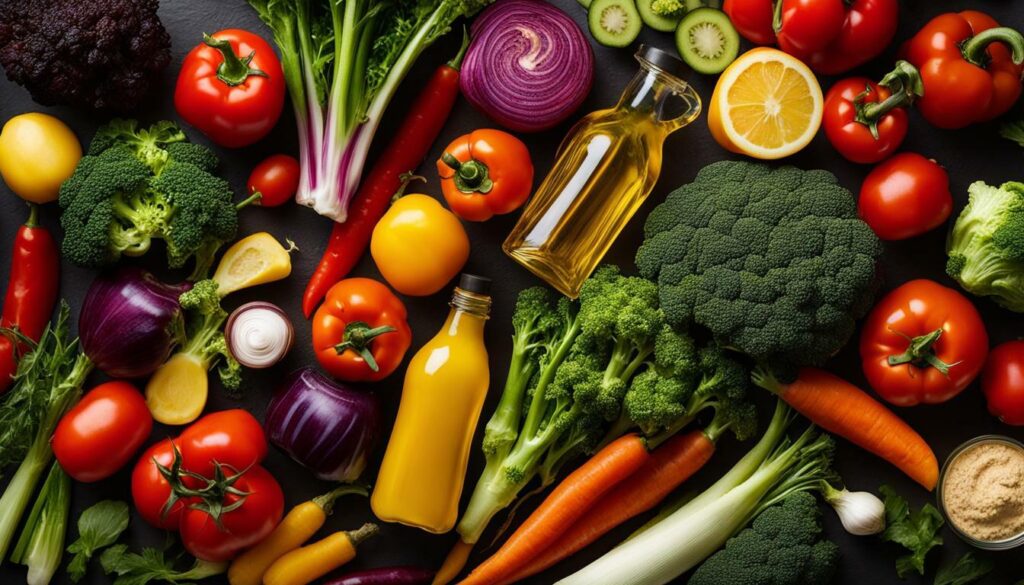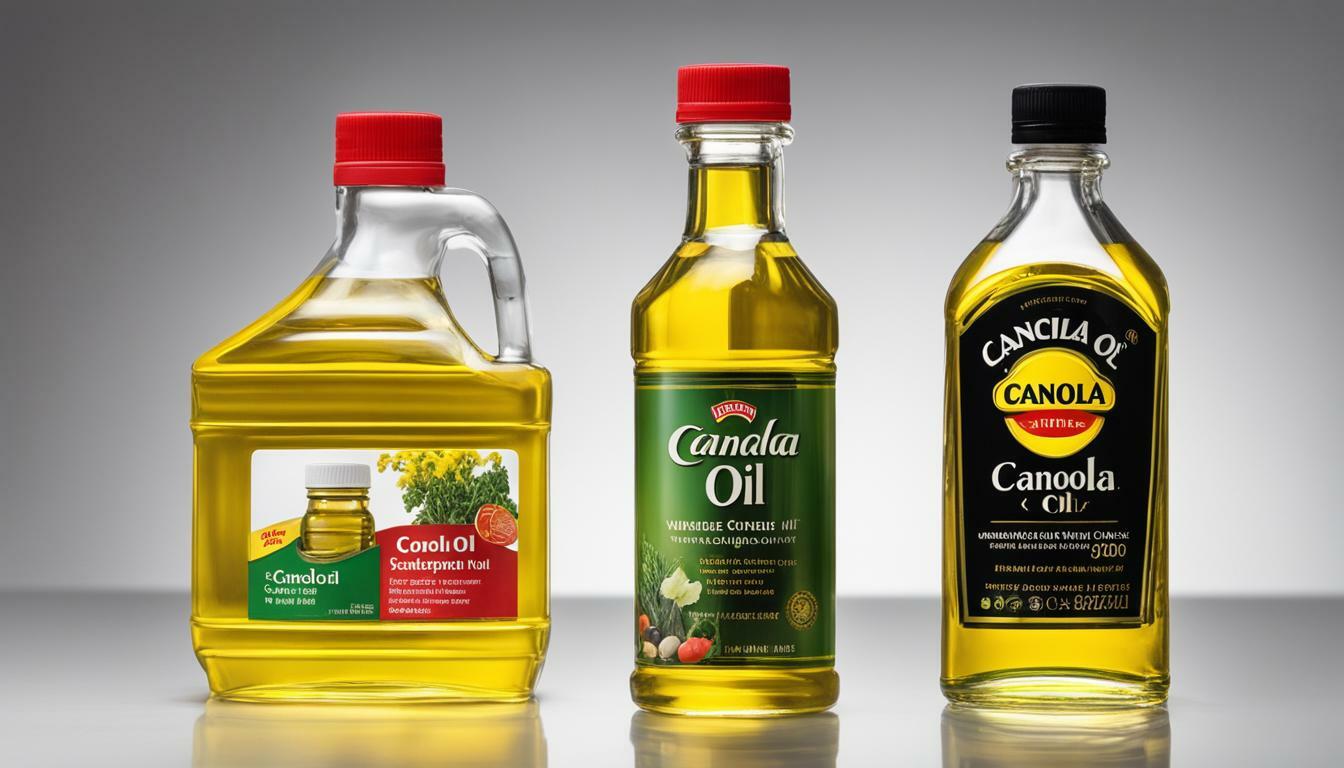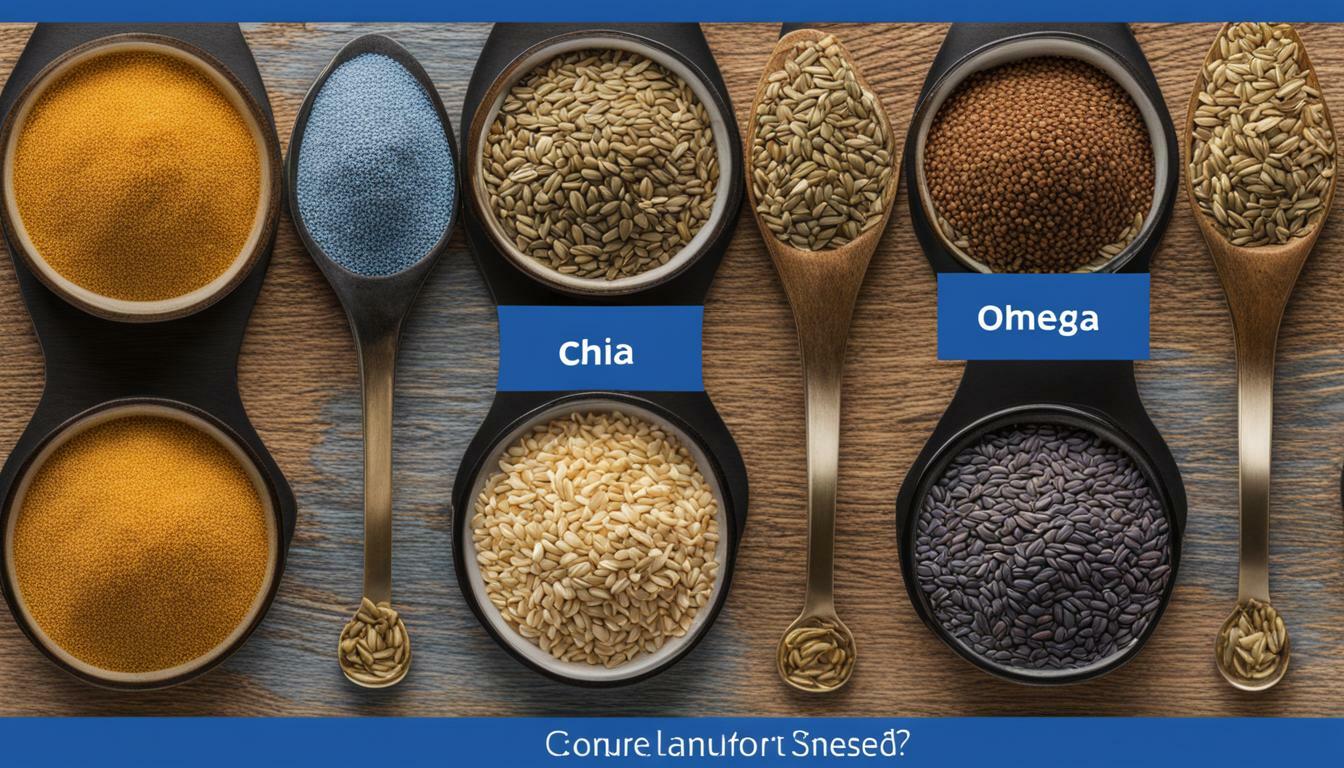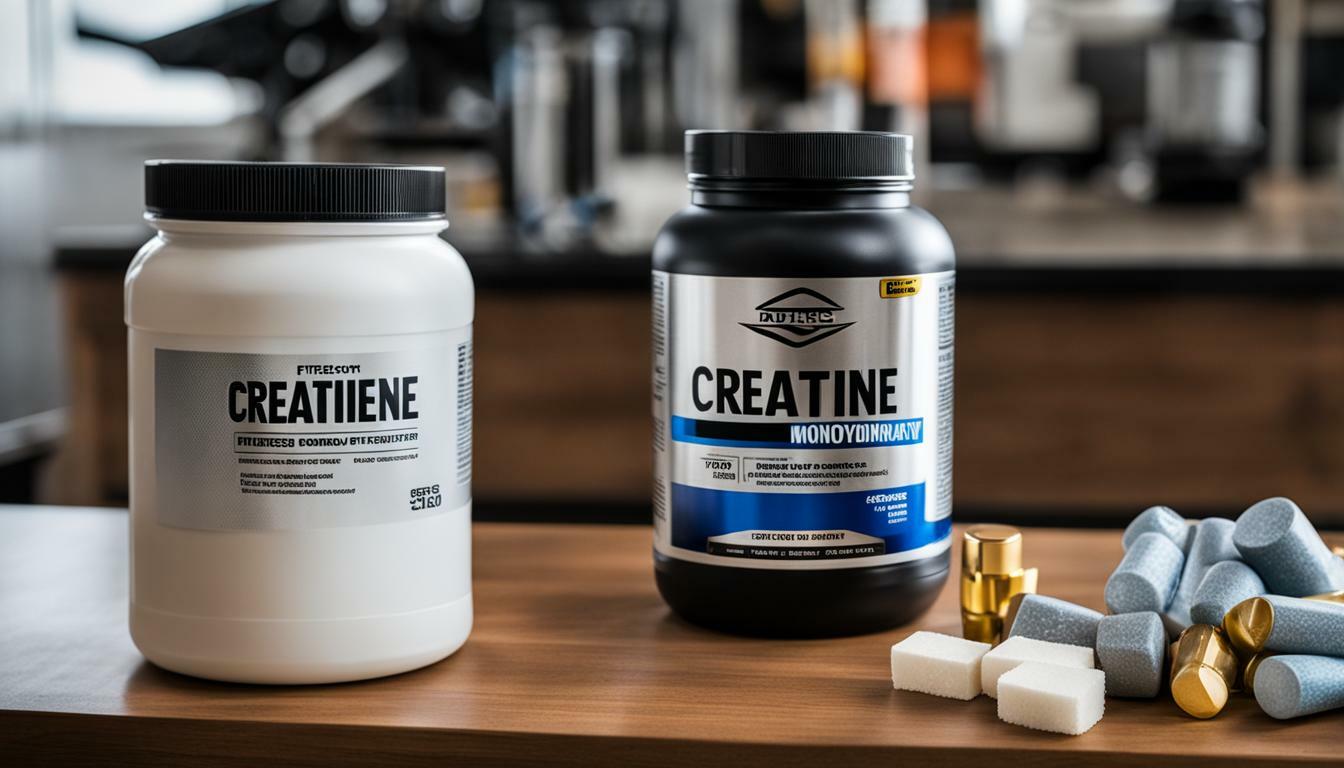Are you curious about the difference between canola oil and vegetable oil? Both oils are commonly used in cooking and share similar characteristics such as their pale yellow color, neutral flavor, and high smoke points. However, there are distinct differences that set them apart.
Canola oil is derived from the rapeseed plant and is known for its lower saturated fat content compared to vegetable oil. It is also higher in heart-healthy monounsaturated fats, making it a healthier option. On the other hand, vegetable oil is a general term that encompasses various oils like soybean oil or corn oil.
Key Takeaways:
- Canola oil is derived from the rapeseed plant and has a lower saturated fat content compared to vegetable oil.
- Vegetable oil is a general term that includes different types of oils like soybean oil or corn oil.
- Both canola oil and vegetable oil can be used interchangeably in recipes, but canola oil is considered the healthier choice.
- Proper storage is essential to maintain the freshness and prevent rancidity of both oils.
What is Canola Oil?
Canola oil, derived from the rapeseed plant, is a popular cooking oil known for its various benefits. It is pale yellow in color and has a neutral flavor, making it versatile for a wide range of culinary applications. One of the key advantages of canola oil is its low saturated fat content, which is beneficial for heart health. In fact, it contains the least amount of saturated fat compared to other commonly used cooking oils.
Canola oil is also rich in monounsaturated fats, which promote good cholesterol levels and help reduce the risk of heart disease. These fats are known to have anti-inflammatory properties and can contribute to improved cardiovascular health. Additionally, canola oil is a good source of omega-3 fatty acids, which have been linked to numerous health benefits, including brain function, joint health, and reduced inflammation.
With its high smoke point, canola oil is suitable for various cooking methods, including sautéing, baking, frying, and grilling. Its neutral flavor allows other ingredients to shine in recipes without overpowering the dish. It is worth noting that canola oil has a longer shelf life compared to other oils, thanks to its stability and resistance to rancidity. This makes it a practical choice for both home cooks and professional chefs.

| Nutrient | Amount per 100g |
|---|---|
| Calories | 884 |
| Total Fat | 100g |
| Saturated Fat | 7g |
| Monounsaturated Fat | 63g |
| Polyunsaturated Fat | 28g |
| Omega-3 Fatty Acids | 9g |
| Omega-6 Fatty Acids | 19g |
As seen in the table above, canola oil is a good source of monounsaturated and polyunsaturated fats, while being low in saturated fat. It is also free from cholesterol, making it a heart-healthy choice for individuals seeking a balanced diet.
What is Vegetable Oil?
Vegetable oil is a broad term that refers to various oils derived from different plant sources. It is commonly used in cooking and is known for its pale yellow color, neutral flavor, and high smoke point. Unlike canola oil, which is specifically derived from the rapeseed plant, vegetable oil encompasses a range of oils such as soybean oil, corn oil, and sunflower oil.
The composition of vegetable oil can vary depending on the plant source it is derived from. For example, soybean oil is high in polyunsaturated fats, while corn oil is rich in omega-6 fatty acids. These different compositions give vegetable oil its unique flavor and nutritional profile. While vegetable oil can be used interchangeably with canola oil in recipes, it is important to note that canola oil is considered the healthier option.

| Type of Oil | Saturated Fat Content | Monounsaturated Fat Content | Polyunsaturated Fat Content |
|---|---|---|---|
| Canola Oil | 7% | 63% | 28% |
| Generic Vegetable Oil | 14% | 24% | 62% |
As shown in the table above, canola oil has a lower saturated fat content compared to generic vegetable oil. It also has a higher monounsaturated fat content, which is known to have heart health benefits. Canola oil is a good source of omega-3 fatty acids, which are essential for brain function and reducing inflammation. On the other hand, generic vegetable oil has a higher polyunsaturated fat content, which can contribute to a more balanced omega-6 to omega-3 ratio.
Summing it up
While both canola oil and vegetable oil have their uses in cooking, canola oil is generally considered the healthier option due to its lower saturated fat content and higher monounsaturated fat content. It is important to store both oils properly in a cool, dark place to maintain their freshness and prevent rancidity. When it comes to making a choice between canola oil and vegetable oil, considering the nutritional profile and your specific dietary needs can help you make an informed decision.
Health Benefits and Nutritional Comparison
Both canola oil and vegetable oil have their own unique health benefits and nutritional profiles. Canola oil is known for its heart-healthy properties, thanks to its high content of monounsaturated fats. These fats are considered beneficial for reducing LDL cholesterol levels and promoting cardiovascular health. In fact, the American Heart Association recommends consuming canola oil as part of a healthy diet. Canola oil also contains omega-3 fatty acids, which have anti-inflammatory properties and contribute to brain health.
On the other hand, vegetable oil, being a general term encompassing different types of oils, provides a diverse range of nutritional benefits. For example, soybean oil, a common type of vegetable oil, is rich in omega-6 fatty acids, vitamin E, and phytosterols. These nutrients play a role in promoting cell health, supporting the immune system, and reducing the risk of chronic diseases.
To better understand the nutritional content of canola oil and vegetable oil, let’s take a look at the following table:
| Canola Oil | Vegetable Oil (Soybean) | |
|---|---|---|
| Saturated Fat (g) | 1 | 2 |
| Monounsaturated Fat (g) | 8 | 24 |
| Polyunsaturated Fat (g) | 4 | 8 |
| Omega-6 Fatty Acids (g) | 2 | 7 |
| Omega-3 Fatty Acids (g) | 0.9 | 0.7 |
| Vitamin E (mg) | 2.4 | 4.6 |
| Phytosterols (mg) | 100 | 250 |
Canola oil is known for its heart-healthy properties, thanks to its high content of monounsaturated fats.
While both canola oil and vegetable oil have their own set of nutritional benefits, it is important to note that moderation and balance are key. Incorporating a variety of healthy oils in your cooking can help promote overall well-being.

Canola oil and vegetable oil have similar cooking uses and can often be used interchangeably in recipes. Both oils have a high smoke point, making them suitable for various cooking methods, including frying, sautéing, and baking. Their pale yellow color and neutral flavor allow them to blend well with different ingredients and enhance the overall taste of the dish.
Whether you’re making stir-fries, salad dressings, or baked goods, canola oil and vegetable oil provide a versatile and reliable option in the kitchen. They offer a light texture and help distribute heat evenly, ensuring your food turns out perfectly cooked.

However, it’s important to note that while canola oil and vegetable oil can be used interchangeably, the choice between the two may depend on personal preference and health considerations. Canola oil, with its lower saturated fat content, is often deemed the healthier option. It is richer in monounsaturated fat, which is known to have heart-protective benefits. On the other hand, vegetable oil, as a general term, encompasses various oils, some of which may have higher saturated fat levels.
Takeaway:
- Canola oil and vegetable oil are versatile cooking oils that can be used interchangeably in recipes.
- Both oils have a high smoke point and neutral flavor, making them suitable for a wide range of dishes and cooking methods.
- Consider choosing canola oil over generic vegetable oil for its lower saturated fat content and higher monounsaturated fat, which promotes heart health.
- Proper storage is essential to maintain the freshness and prevent rancidity of both oils.
| Canola Oil | Vegetable Oil | |
|---|---|---|
| Smoke Point | 400°F (204°C) | 400-450°F (204-232°C) |
| Saturated Fat | 7% | 13-14% |
| Monounsaturated Fat | 63% | 20-25% |
| Polyunsaturated Fat | 28% | 55-60% |
Note: Percentage values are approximate and may vary slightly depending on the brand and specific type of oil.
Conclusion
In conclusion, understanding the difference between canola oil and vegetable oil can help you make a more informed choice for your cooking and dietary needs.
Canola oil and vegetable oil are both commonly used in cooking and have similar characteristics, such as their pale yellow color, neutral flavor, and high smoke points.
However, there are differences between the two. Canola oil is derived from the rapeseed plant and is lower in saturated fat compared to vegetable oil. Canola oil is also higher in monounsaturated fat, which is beneficial for heart health.
Vegetable oil, on the other hand, is a general term that can include various oils, such as soybean oil or corn oil. Both oils can be used interchangeably in recipes, but canola oil is considered the healthier option due to its lower saturated fat content.
It is important to store both oils properly to maintain their freshness and prevent rancidity.
FAQ
What is the difference between canola oil and vegetable oil?
Canola oil is derived from the rapeseed plant and is lower in saturated fat compared to vegetable oil. Canola oil is also higher in monounsaturated fat, which is beneficial for heart health. Vegetable oil is a general term that can include various oils, such as soybean oil or corn oil.
What is canola oil?
Canola oil is derived from the rapeseed plant and is known for its pale yellow color, neutral flavor, and high smoke point. It is lower in saturated fat compared to vegetable oil and higher in monounsaturated fat, making it a healthier choice for heart health.
What is vegetable oil?
Vegetable oil is a general term that encompasses different types of oils, such as soybean oil or corn oil. It is commonly used in cooking and has a pale yellow color, neutral flavor, and high smoke point.
What are the health benefits and nutritional comparison of canola oil and vegetable oil?
Canola oil and vegetable oil both have health benefits, but canola oil is considered the healthier option. Canola oil is lower in saturated fat and higher in monounsaturated fat, which is beneficial for heart health. Vegetable oil, on the other hand, can include various oils with different nutritional profiles.
Can I interchangeably use canola oil and vegetable oil in recipes?
Yes, canola oil and vegetable oil can be used interchangeably in recipes. However, canola oil is considered the healthier choice due to its lower saturated fat content.



